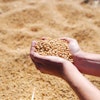Skretting will significantly increase its research capacity with an expansion of the Skretting Aquaculture Research Centre (ARC) Lerang Research Station in Norway and a new facility at Pargua in Chile.
Skretting has research facilities in Norway, China, Italy, Japan, Australia, Egypt and Ecuador. To match the rapid growth of aquaculture and the technological advancements of the industry, the decision has been taken to invest in expanding its research capabilities to continue to support the ever-changing industry’s progress.
Skretting’s R&D expansion will focus on two key areas. Recirculation aquaculture systems (RAS) are becoming increasingly popular, not only for salmon, but also other species. Today, companies in all of the world’s main production regions are increasingly looking to extend the use of RAS beyond the hatchery and early life stages to cover entire production cycles. Skretting ARC’s upgrade to its facility at Lerang in Norway will primarily be focused on the process of recirculation – examining and optimizing the whole system while taking into consideration inputs and outputs.
At the same time, another major change taking place across the entire aquaculture industry is the expanding raw material base.
“Things have changed rapidly, from the early days of diets with only fishmeal and fish oil to now where Skretting has achieved full flexibility with regard to fishmeal with our FLX diets. We expect similar results in the near future from our investigations into fish oil alternatives,” says Alex Obach, Skretting ARC managing director.
Alternative raw materials
Launched in 2016, Skretting’s FLX diets proved that equal health, growth and performance could be achieved using zero fishmeal in carefully formulated feeds. This work is now being progressed through investigation into additional alternative raw materials.
“Chile has the second largest salmon farming industry in the world. It is also able to use a different set of raw materials in its salmon feeds than Europe does, including land animal proteins. So it makes sense for Skretting to invest in research facilities in this region,” continues Obach.
The Chilean facility will cover the entire production cycle, and focus on raw materials and challenges that directly affect the local industry, he says.
In the interest of sharing knowledge and progressing the sector, both facilities will also explore possible collaborations with specialist research centers, universities and other stakeholders.

















